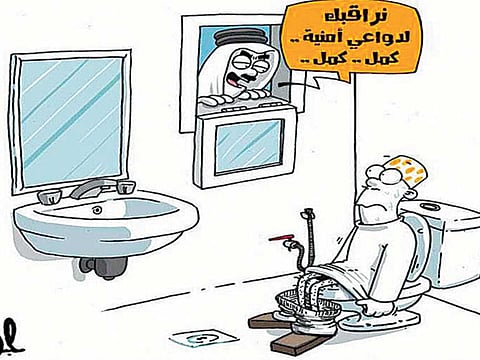Saudi Shura member says surveillance proposal misunderstood
Suggestion aims to reinforce security and help deter potential criminals

Manama: A Saudi Shura Council member who had waded into controversy on social media for suggesting placing cameras to monitor homes said that he had been misunderstood.
Moflih Al Rasheedi had called for installing security and surveillance cameras as a measure to protect citizens and residents.
Under the proposal, private security and guard companies could be commissioned to implement and oversee the security service using digital electronic technology systems.
Al Rasheedi said the service should be optional and residents could accept or refuse it.
However, the Shura Council on Tuesday rejected the proposal amid concerns by some members that the camera recordings could be a violation of people’s privacy and could find their way to social networks.
The members said surveillance cameras should instead be installed in schools, official buildings and public facilities.
Social network dismissed the proposal, saying it would deprive them of the only place where they could enjoy some privacy and suggested placing cameras in public areas.
“This means that when I sit with my wife, she will have to be fully covered so that they do not catch her on camera,” one blogger posted.
Abdullah, another blogger, said that the proposal would put all Saudis under surveillance at all times.
“Where can we go now without being monitored? The Commission for the Promotion of Virtue and Prevention of Vice (the religious police) monitors your moves in malls, Saher (The traffic surveillance system) monitors your moves on the road and now Al Rasheedi is monitoring your moves at home,” he posted.
However, Al Rasheedi said that he was shocked by the online response to his proposal, adding that the information about the placement and purposes of the cameras was not accurate.
“The proposal was to amend an article in the civilian security guard regulations in order to allow private civilian security companies and establishments to provide security services to the homes of Saudi citizens and residents,” he said. “The service will be based on digital electronic technology systems linked to the emergency centres under the ministry of interior. The whole purpose is to protect the citizens and the residents,” he said, quoted by local news site Sabq.
The link to the security centres allows a permanent monitoring of the streets to uncover all kinds of crimes, he said.
“All major cities have surveillance cameras and several crimes have been resolved thanks to them. I can refer to the terror attack in Boston and to the assassination of [Hamas commander Mahmoud] Al Mabhouh in Dubai,” he said.
Al Rasheedi said a large number of Saudi families purchase surveillance cameras and one study concluded they spend SR75 million (Dh73.4 million) annually on them.
“It would be much more beneficial to regulate the services and to task experienced companies with the surveillance,” he said. “Statistics from security authorities indicate that the rate of crimes is lower in malls equipped with surveillance cameras. The most modern countries deal with crimes through using digital security that covers all aspects of life. If we apply the same technology in Saudi Arabia, we will save a lot of time and efforts in following up security cases and in identifying the perpetrators,” he said.
Sign up for the Daily Briefing
Get the latest news and updates straight to your inbox


